赖世雄英语入门
赖世雄零起点英语1(入门篇)

读书笔记模板
01 思维导图
03 读书笔记 05 目录分析
目录
02 内容摘要 04 精彩摘录 06 作者介绍
思维导图
关键字分析思维导图
老师
爱好
入门篇
知识
零起点
时间
宾语
零起点
语法
英语 副词
疑问
赖世雄
活用
信
进行时
名词
动词
笔友
内容摘要
很多人想学好英语,却总是事与愿违,其实不是我们学不好,而是英语基础不够扎实。
贴身家教,不出国也能把英语学得棒棒的!
《赖世雄零起点英语》系列由赖世雄老师和吴纪维老师精心编写,
常青藤英语团队细心编辑加工,一共三册,以美语为主,共230课,依次分为入门篇、基础篇、进阶篇。零起点1
是零散的基础语法知识点的介绍,2和3慢慢介入课文的形式,通过文章语境的实例运用进一步巩固前附的语法知
识。是一套由浅入深、循序渐进、图文并茂、内容实用的英语教程,配合讲解音频,句句干货,让学习扎实又有
every day是时间副词,表示“每一天”,是两个词,可以置于句尾或句首;everyday是形容词,表示“每 天的”,是一个词,之后一定要加名词。
字尾如果是t或d时,若与后面的词没有连读,则该t或d要消音。如Paul and David中and的d要消音。
here表示“这里”;there表示“那里”。两者之前都可以接over,用来强调语气,表示“就在”。
Lesson 25 活用 特殊疑问句及一般
问句
Lesson 27 时刻 的说法1
Lesson 28 时刻的 说法2
Lesson 29 活用时 间名词
Lesson 30 介绍现 在进行时
赖世雄初级美语入门
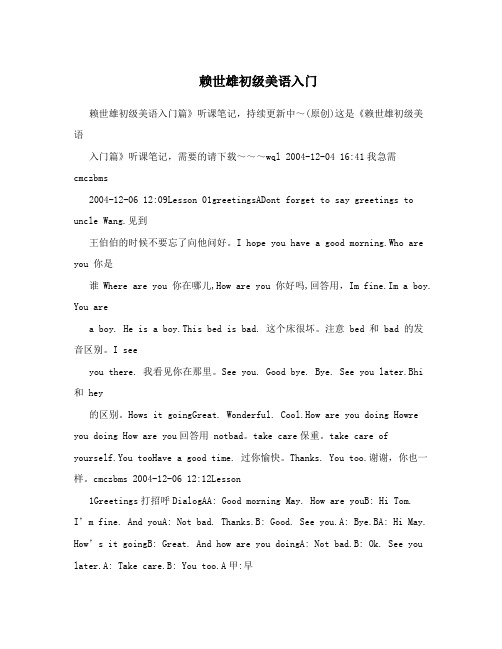
赖世雄初级美语入门赖世雄初级美语入门篇》听课笔记,持续更新中~(原创)这是《赖世雄初级美语入门篇》听课笔记,需要的请下载~~~wql 2004-12-04 16:41我急需cmczbms2004-12-06 12:09Lesson 01greetingsADont forget to say greetings to uncle Wang.见到王伯伯的时候不要忘了向他问好。
I hope you have a good morning.Who are you 你是谁Where are you 你在哪儿,How are you 你好吗,回答用,Im fine.Im a boy. You area boy. He is a boy.This bed is bad. 这个床很坏。
注意 bed 和 bad 的发音区别。
I seeyou there. 我看见你在那里。
See you. Good bye. Bye. See you later.Bhi 和 hey的区别。
Hows it goingGreat. Wonderful. Cool.How are you doing Howre you doing How are you回答用 notbad。
take care保重。
take care of yourself.You tooHave a good time. 过你愉快。
Thanks. You too.谢谢,你也一样。
cmczbms 2004-12-06 12:12Lesson1Greetings打招呼DialogAA: Good morning May. How are youB: Hi Tom.I’m fine. And youA: Not bad. Thanks.B: Good. Se e you.A: Bye.BA: Hi May. How’s it goingB: Great. And how are you doingA: Not bad.B: Ok. See you later.A: Take care.B: You too.A甲:早啊,小梅。
赖世雄美语入门学习笔记
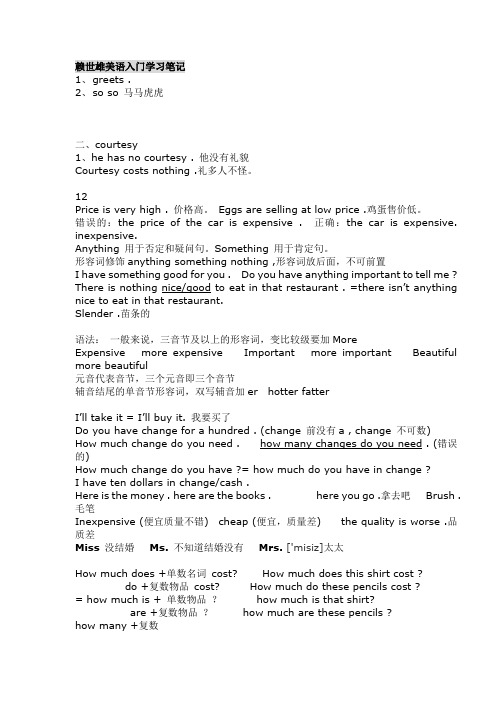
赖世雄美语入门学习笔记1、greets .2、so so 马马虎虎二、courtesy1、he has no courtesy . 他没有礼貌Courtesy costs nothing .礼多人不怪。
12Price is very high . 价格高。
Eggs are selling at low price .鸡蛋售价低。
错误的:the price of the car is expensive . 正确:the car is expensive. inexpensive.Anything 用于否定和疑问句。
Something 用于肯定句。
形容词修饰anything something nothing ,形容词放后面,不可前置I have something good for you . Do you have anything important to tell me ? There is nothing nice/good to eat in that restaurant . =there isn’t anything nice to eat in that restaurant.Slender .苗条的语法:一般来说,三音节及以上的形容词,变比较级要加MoreExpensive more expensive Important more important Beautiful more beautiful元音代表音节,三个元音即三个音节辅音结尾的单音节形容词,双写辅音加er hotter fatterI’ll take it = I’ll buy it. 我要买了Do you have change for a hundred . (change 前没有a , change 不可数) How much change do you need . how many changes do you need . (错误的)How much change do you have ?= how much do you have in change ?I have ten dollars in change/cash .Here is the money . here are the books . here you go .拿去吧Brush .毛笔Inexpensive (便宜质量不错) cheap (便宜,质量差) the quality is worse .品质差Miss没结婚Ms. 不知道结婚没有Mrs.['misiz]太太How much does +单数名词cost? How much does this shirt cost ?do +复数物品cost? How much do these pencils cost ?= how much is + 单数物品?how much is that shirt?are +复数物品?how much are these pencils ?how many +复数13课Hostess 女服务员I’d like to book(reserve) a table for seven. 订桌子(门票通常用reserve)Do you have a table for two ? =do you have a table for two people.有两个人的桌子么May I have the menu .我能看菜单么。
赖世雄初级美语讲解修正第一版

Lesson 1 Self IntroductionThe lesson is very good. Lesson one lesson two“My name is Robert. My friends call me Bob. I am twenty years old. I am Chinese. I come from Beijing. There are six people in my family. I have one younger sister and two old brothers. We are not rich, but we are a happy family.”Part one 第一部分reading 阅读My bicycle my homeWhat’s your name, please? Open the door, please. My name is Peter.Call me, please. Call me when you have time. Give me a call when you have time. 8:18I am ten years old. He is one year old.I am twenty years of age. I am twenty. How old are you?I am a Chinese. 名词中国人I am Chinese. 形容词中国人的American 美国人(名词)He is an American. He is American. 美国人的(形容词)This is a book. I come from Guangdong. He comes from Sichuan. I am from Beijing.Where are you from? Where do you come from?I am from Beijing. I come from Beijing. 18:56There is a book on the desk. 有……. There is a cat in the room.People 两个人以上才能用一个人用one person Two persons 两个人= two peopleThree people four peopleI have a book. He has a book. 主语有思想,有生命25:09 SubstitutionsLesson 2 Nice to Meet You“HI! My name is Mike. Hi! I’m Nancy. Nice to meet you. Nice to meet you, too. Where are you from? I’m from Shanghai. And you? I’m from Chicago. ” 1:31 Hi! I am Mike. I’m Mike. HI! There. 嗨!你好。
赖世雄英语入门
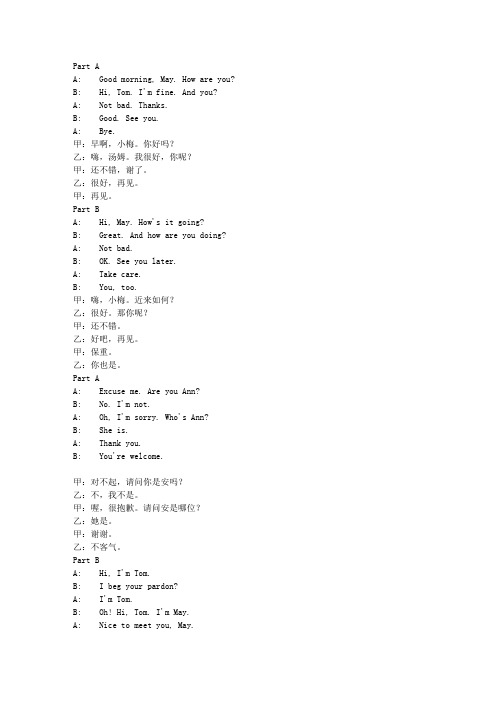
Part AA: Good morning, May. How are you? B: Hi, Tom. I'm fine. And you?A: Not bad. Thanks.B: Good. See you.A: Bye.甲:早啊,小梅。
你好吗?乙:嗨,汤姆。
我很好,你呢?甲:还不错,谢了。
乙:很好,再见。
甲:再见。
Part BA: Hi, May. How's it going?B: Great. And how are you doing? A: Not bad.B: OK. See you later.A: Take care.B: You, too.甲:嗨,小梅。
近来如何?乙:很好。
那你呢?甲:还不错。
乙:好吧,再见。
甲:保重。
乙:你也是。
Part AA: Excuse me. Are you Ann?B: No. I'm not.A: Oh, I'm sorry. Who's Ann?B: She is.A: Thank you.B: You're welcome.甲:对不起,请问你是安吗?乙:不,我不是。
甲:喔,很抱歉。
请问安是哪位?乙:她是。
甲:谢谢。
乙:不客气。
Part BA: Hi, I'm Tom.B: I beg your pardon?A: I'm Tom.B: Oh! Hi, Tom. I'm May.A: Nice to meet you, May.B: Pleased to meet you.甲:嗨,我是汤姆。
乙:对不起,请再说一遍好吗?甲:我是汤姆。
乙:哦!嗨,汤姆。
我是小梅。
甲:很高兴认识你,小梅。
乙:幸会,幸会。
Part AA: Excuse me. What's your name?B: I'm May.A: Hi, May. Where are you from?B: I'm from Hong Kong. What about you? A: I'm From Japan.甲:对不起。
赖世雄经典英语语法和入门英语语法
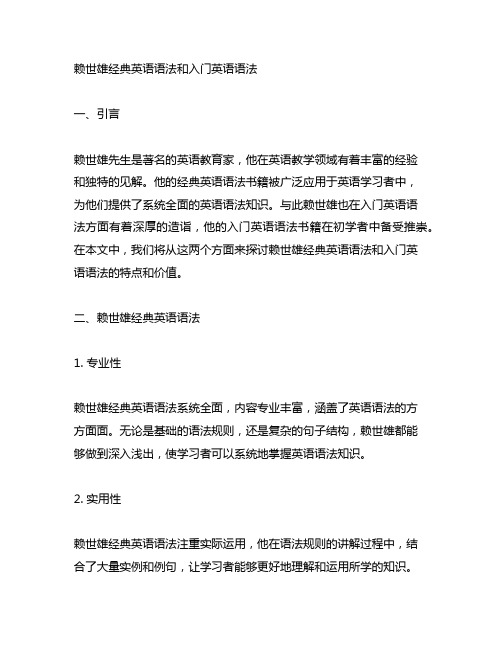
赖世雄经典英语语法和入门英语语法一、引言赖世雄先生是著名的英语教育家,他在英语教学领域有着丰富的经验和独特的见解。
他的经典英语语法书籍被广泛应用于英语学习者中,为他们提供了系统全面的英语语法知识。
与此赖世雄也在入门英语语法方面有着深厚的造诣,他的入门英语语法书籍在初学者中备受推崇。
在本文中,我们将从这两个方面来探讨赖世雄经典英语语法和入门英语语法的特点和价值。
二、赖世雄经典英语语法1. 专业性赖世雄经典英语语法系统全面,内容专业丰富,涵盖了英语语法的方方面面。
无论是基础的语法规则,还是复杂的句子结构,赖世雄都能够做到深入浅出,使学习者可以系统地掌握英语语法知识。
2. 实用性赖世雄经典英语语法注重实际运用,他在语法规则的讲解过程中,结合了大量实例和例句,让学习者能够更好地理解和运用所学的知识。
这种实用性的特点使得赖世雄的英语语法书籍备受欢迎,成为了许多英语学习者的首选。
3. 突出重点在讲解英语语法时,赖世雄能够很好地把握重点和难点,对于学习者来说,这意味着他们可以更加高效地学习英语语法,抓住重点,突破难点。
4. 丰富多样的习题赖世雄在他的英语语法书籍中提供了大量的习题,这些习题既有选择题,又有填空题,还有翻译题等等,这些多样的练习形式可以帮助学习者更好地巩固所学的知识,提高英语语法运用能力。
三、入门英语语法1. 浅显易懂赖世雄的入门英语语法书籍在语言表达和解释方面非常浅显易懂,适合英语初学者阅读。
他用通俗易懂的语言解释了英语语法中的基本知识,让初学者可以轻松地入门。
2. 全面系统尽管是入门英语语法,但赖世雄也在内容上力求全面和系统,包括了英语的基本句型和基本语法规则,为初学者打下了坚实的基础。
3. 实用性赖世雄的入门英语语法书籍同样重视实用性,他通过丰富的例句和实例,让学习者可以更好地理解和运用英语语法知识。
4. 注重训练在入门英语语法书籍中,赖世雄也设计了大量的练习题,帮助初学者巩固所学的知识,提高英语语法运用能力。
大师赖世雄的英语学习方法
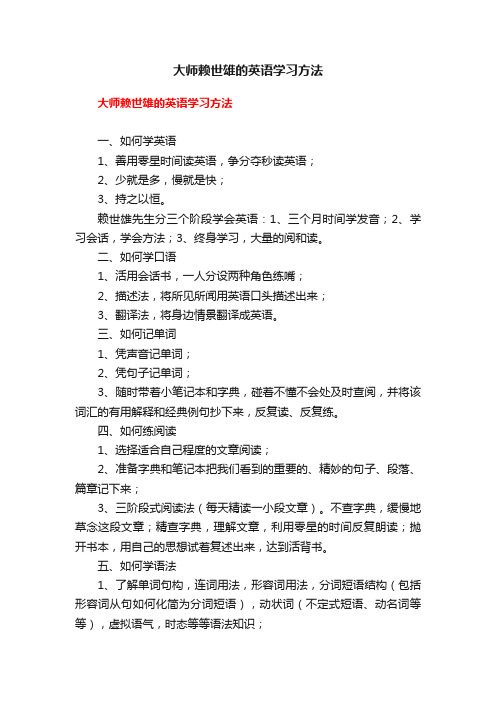
大师赖世雄的英语学习方法大师赖世雄的英语学习方法一、如何学英语1、善用零星时间读英语,争分夺秒读英语;2、少就是多,慢就是快;3、持之以恒。
赖世雄先生分三个阶段学会英语:1、三个月时间学发音;2、学习会话,学会方法;3、终身学习,大量的阅和读。
二、如何学口语1、活用会话书,一人分设两种角色练嘴;2、描述法,将所见所闻用英语口头描述出来;3、翻译法,将身边情景翻译成英语。
三、如何记单词1、凭声音记单词;2、凭句子记单词;3、随时带着小笔记本和字典,碰着不懂不会处及时查阅,并将该词汇的有用解释和经典例句抄下来,反复读、反复练。
四、如何练阅读1、选择适合自己程度的文章阅读;2、准备字典和笔记本把我们看到的重要的、精妙的句子、段落、篇章记下来;3、三阶段式阅读法(每天精读一小段文章)。
不查字典,缓慢地草念这段文章;精查字典,理解文章,利用零星的时间反复朗读;抛开书本,用自己的思想试着复述出来,达到活背书。
五、如何学语法1、了解单词句构,连词用法,形容词用法,分词短语结构(包括形容词从句如何化简为分词短语),动状词(不定式短语、动名词等等),虚拟语气,时态等等语法知识;2、理论联系实际,结合所读文章,分析个别句子,融会贯通英语语法知识。
六、如何练听力1、改善自己的发音,尽量模仿母语发音腔调;2、精听与泛听相结合;(泛听:草听大意,抓住关键词key word,长久坚持。
精听:把泛听养成的习惯责成一小段听写出来,品味lazy English,利用时尚的学习工具录一些新闻等听力材料,反复听。
)七、如何学写作英语写作要求:1、运用精确的语法;2、地道的用字遣词。
布局结构可以采用TDC理论,即:1、T---topic sentence.2、D---development.3、C---conclusion.下笔时一定要用简单的能够掌控的词汇,不要用似是而非的模糊词汇,按照写作大纲要求作文。
除此以外,还要多读老外的文章,勤加琢磨,勤查字典,日积月累,不断提升写作水平。
赖世雄美语从头学-入门篇
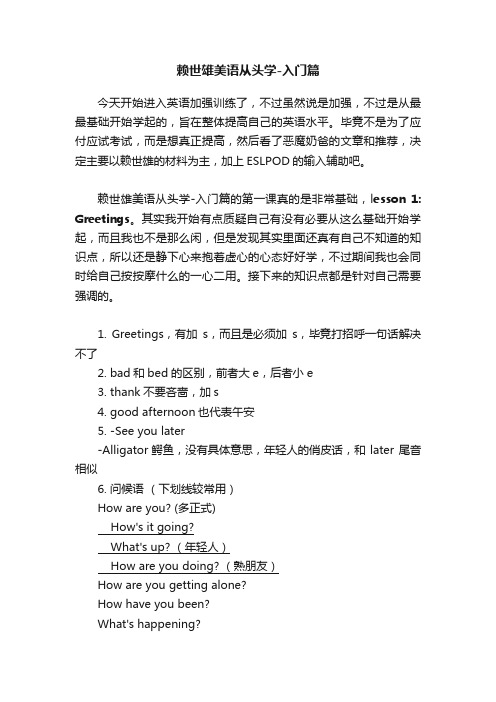
赖世雄美语从头学-入门篇今天开始进入英语加强训练了,不过虽然说是加强,不过是从最最基础开始学起的,旨在整体提高自己的英语水平。
毕竟不是为了应付应试考试,而是想真正提高,然后看了恶魔奶爸的文章和推荐,决定主要以赖世雄的材料为主,加上ESLPOD的输入辅助吧。
赖世雄美语从头学-入门篇的第一课真的是非常基础,lesson 1: Greetings。
其实我开始有点质疑自己有没有必要从这么基础开始学起,而且我也不是那么闲,但是发现其实里面还真有自己不知道的知识点,所以还是静下心来抱着虚心的心态好好学,不过期间我也会同时给自己按按摩什么的一心二用。
接下来的知识点都是针对自己需要强调的。
1. Greetings,有加s,而且是必须加s,毕竟打招呼一句话解决不了2. bad和bed的区别,前者大e,后者小e3. thank不要吝啬,加s4. good afternoon也代表午安5. -See you later-Alligator 鳄鱼,没有具体意思,年轻人的俏皮话,和later尾音相似6. 问候语(下划线较常用)How are you? (多正式)How's it going?What's up? (年轻人)How are you doing? (熟朋友)How are you getting alone?How have you been?What's happening?7. 问候答句区别a. 都有youHow are you?=How are you doing?=How are you getting alone?answer:I'm fine, thank you. (跟fine有关的回答持保留意见,比较多说法是一般不用fine这种回答,我个人听到最多的就是good) Fine, thanks.Great, thanks.Not bad, thanks.So-so, thank you.b. How have you been?这个问法是完成时,所以不能用amanswer:I have been fine, thank you.Fine, thank you.c. How's it going?answer: Not bad, thank you.So-so, thank you.Great, thank you.Fine, thank you.d. What's up/What's happening?answer: Nothing much.Same as usual.8. 感谢Thanks a lot. (非正式)Thanks a million (俏皮话)Lesson 2 Courtesy (礼貌)Idiom: Courtesy costs nothing. 礼貌不花钱;礼多人不怪。
赖世雄初级美语(全)
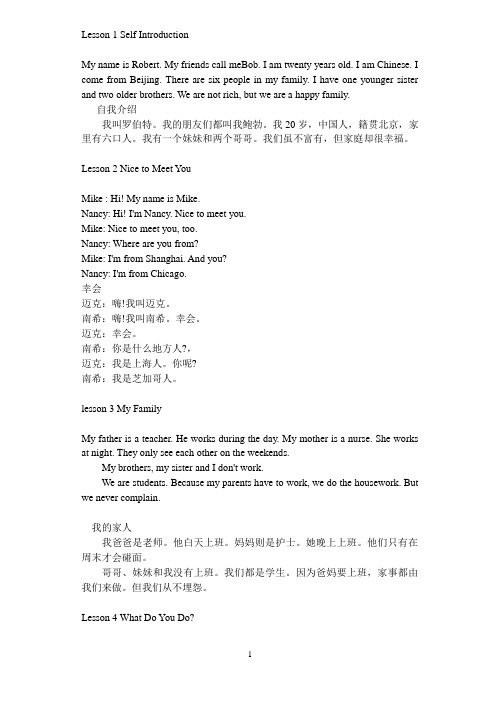
Lesson 1 Self IntroductionMy name is Robert. My friends call meBob. I am twenty years old. I am Chinese. I come from Beijing. There are six people in my family. I have one younger sister and two older brothers. We are not rich, but we are a happy family.自我介绍我叫罗伯特。
我的朋友们都叫我鲍勃。
我20岁,中国人,籍贯北京,家里有六口人。
我有一个妹妹和两个哥哥。
我们虽不富有,但家庭却很幸福。
Lesson 2 Nice to Meet YouMike : Hi! My name is Mike.Nancy: Hi! I'm Nancy. Nice to meet you.Mike: Nice to meet you, too.Nancy: Where are you from?Mike: I'm from Shanghai. And you?Nancy: I'm from Chicago.幸会迈克:嗨!我叫迈克。
南希:嗨!我叫南希。
幸会。
迈克:幸会。
南希:你是什么地方人?,迈克:我是上海人。
你呢?南希:我是芝加哥人。
lesson 3 My FamilyMy father is a teacher. He works during the day. My mother is a nurse. She works at night. They only see each other on the weekends.My brothers, my sister and I don't work.We are students. Because my parents have to work, we do the housework. But we never complain.我的家人我爸爸是老师。
赖世雄经典英语语法和入门英语语法

赖世雄经典英语语法和入门英语语法赖世雄经典英语语法与入门英语语法赖世雄(Raymond Murphy)是一位著名的英语教育家和语法学家。
他以他的经典英语语法书籍而闻名,这些书籍被广泛应用于学校和语言培训机构。
本文将介绍赖世雄经典英语语法以及入门英语语法,旨在帮助读者更好地学习和理解英语语法知识。
一、赖世雄经典英语语法赖世雄的经典英语语法包括《英语语法使用》(English Grammar in Use)和《基础英语语法》(Essential Grammar in Use)。
这两本书都以简明易懂的方式呈现了英语语法知识,并提供了大量的练习题和例句,帮助学习者巩固所学内容。
《英语语法使用》是一本系列教材,适用于不同程度的学生。
该系列书分为三个不同级别:初级、中级和高级。
每个级别的书都包含了英语中最常用的语法知识,并通过大量的例句和练习题帮助学生巩固记忆。
《基础英语语法》是赖世雄的另一本经典教材,它更适用于初学者。
这本书以同样简明的方式介绍了英语语法的基本知识,并提供了大量的例句和练习题。
这些例句和练习题帮助学生理解和运用语法规则,提高他们的英语水平。
赖世雄的经典英语语法以其简单易懂的风格和系统的知识结构而受到广大学习者的喜爱。
它为学生提供了丰富的语法知识和相关练习,在英语学习中起到了重要的辅助作用。
二、入门英语语法除了赖世雄的经典英语语法外,还有一些入门级的英语语法教材适用于英语学习初级阶段的学生。
这些教材包括《初级英语语法》(Basic English Grammar)和《大学英语语法精讲》(College English Grammar)。
《初级英语语法》是一本简单易懂的英语语法教材,适用于英语学习初级阶段的学生。
它包含了英语语法的基本知识,并通过大量的例句和练习题帮助学生巩固所学内容。
这本教材注重实际运用,帮助学生培养语法意识和语言表达能力。
《大学英语语法精讲》是一本更系统和深入的英语语法教材,适用于大学英语专业学生。
赖世雄美语从头学-入门篇
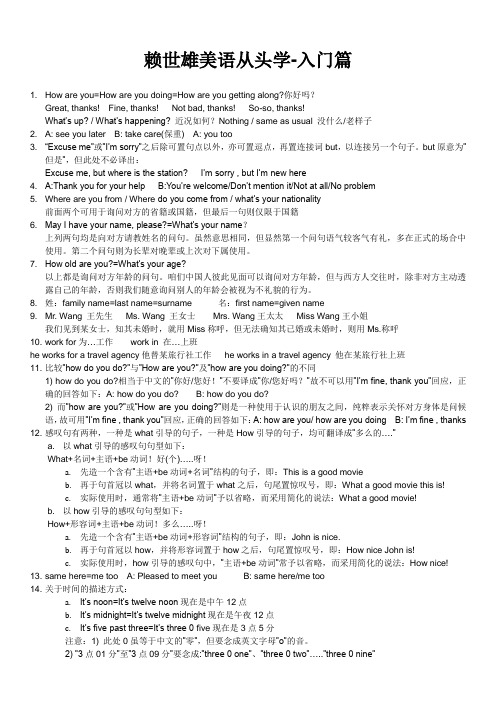
赖世雄美语从头学-入门篇1. How are you=How are you doing=How are you getting along?你好吗?Great, thanks! Fine, thanks! Not bad, thanks! So-so, thanks!What’s up? / What’s happening?近况如何?Nothing / same as usual 没什么/老样子2. A: see you later B: take care(保重) A: you too3. “Excuse me”或”I’m sorry”之后除可置句点以外,亦可置逗点,再置连接词but,以连接另一个句子。
but原意为”但是”,但此处不必译出:Excuse me, but where is the station? I’m sorry , but I’m new here4. A:Thank you for your help B:You’re welcome/Don’t mention it/Not at all/No problem5. Where are you from / Where do you come from / what’s your nationality前面两个可用于询问对方的省籍或国籍,但最后一句则仅限于国籍6. May I have your name, please?=What’s your name?上列两句均是向对方请教姓名的问句。
虽然意思相同,但显然第一个问句语气较客气有礼,多在正式的场合中使用。
第二个问句则为长辈对晚辈或上次对下属使用。
7. How old are you?=What’s your age?以上都是询问对方年龄的问句。
咱们中国人彼此见面可以询问对方年龄,但与西方人交往时,除非对方主动透露自己的年龄,否则我们随意询问别人的年龄会被视为不礼貌的行为。
赖世雄美语从头学初级篇Lesson 1课文及讲解
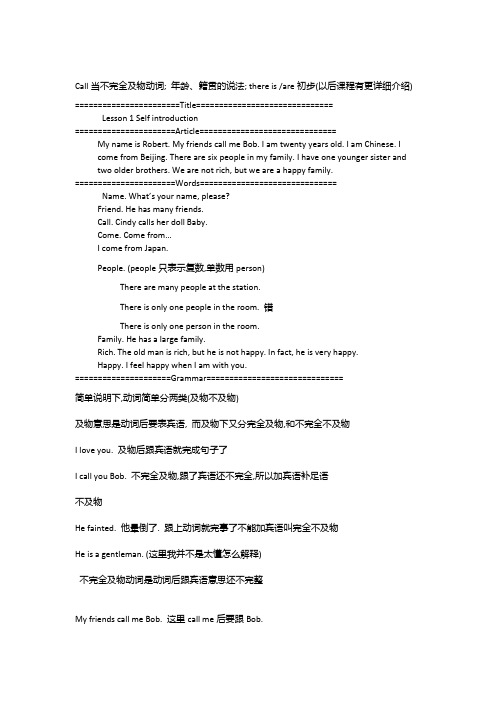
Call当不完全及物动词; 年龄、籍贯的说法; there is /are初步(以后课程有更详细介绍)=======================Title==============================Lesson 1 Self introduction======================Article==============================My name is Robert. My friends call me Bob. I am twenty years old. I am Chinese. Icome from Beijing. There are six people in my family. I have one younger sister and two older brothers. We are not rich, but we are a happy family.======================Words==============================Name. What’s your name, please?Friend. He has many friends.Call. Cindy calls her doll Baby.Come. Come from…I come from Japan.People. (people只表示复数,单数用person)There are many people at the station.There is only one people in the room. 错There is only one person in the room.Family. He has a large family.Rich. The old man is rich, but he is not happy. In fact, he is very happy.Happy. I feel happy when I am with you.=====================Grammar==============================简单说明下,动词简单分两类(及物不及物)及物意思是动词后要表宾语, 而及物下又分完全及物,和不完全不及物I love you. 及物后跟宾语就完成句子了I call you Bob. 不完全及物,跟了宾语还不完全,所以加宾语补足语不及物He fainted. 他晕倒了. 跟上动词就完事了不能加宾语叫完全不及物He is a gentleman. (这里我并不是太懂怎么解释)不完全及物动词是动词后跟宾语意思还不完整My friends call me Bob. 这里call me后要跟Bob.They call the little girl…这里并没有结束后面必须加宾语补足语They call the little girl Mary.I am twenty years old.句子结构为人+be动词+数字+year(s) +old/of age.I am twenty years old.The baby is one year old.He is forty years of age.Age.看起来比实际年轻的用法Look young of one’s age. == Look younger than one really is.You look young of your age. You look younger than you are.He look young of his age. He younger than he really is.I am Chinese. = I am a Chinese.当形容词用不用加a,当名词用要加aThere are six people in my family.这里there are表示有(后面是复数) there同时也是副词”那里”的意思,但后面跟be动词is/are时表示有,以后会说到have这个有的区别Put the book there. 把书放在那里=======================讲解==============================Lesson one self introductionThe lesson is very good. 这一课相当不错Lesson one/two 第一/二课Part one第一部分reading 阅读My name is Robert.My 我的my bicycle我的自行车my home我家Name 名字What's your name, please? 请问你叫什么名字.=what is your name, please?My name is Peter. My name is Robert.please,请,但英美一般放句尾,please前通常放逗号Open the door, please.My friends call me Bob.Friend +s是朋友的复数,2个及以上call除了称某人为...还有打电话的意思Call me, please. 请打电话给我Call me when you have time. 有空给我电话Give me a call when you have time.在这句,call为名词(如果暂时不理解不是很重要)I am twenty years old.I am * year(s) old 我是多少岁,当一岁就用year没有复数,但你一岁也说不出这句. He is one year old.I am twenty years. (那就是我20年,没人理解是什么意思)old不能省,但也可以改用of age.I am twenty years of age.也可以直接I am twenty.How old are you? 你多大年龄,按中文说法就是: you are how old. 英语中疑问词需要放在句首(以后会具体讲)在英美环境,一般男的不能随便问女人年龄I am Chinese.I am a Chinese.这样也行,但不加也可以,一个是名词,一个是形容词(如果暂时不理解没关系) 单数名词要加冠词This is a book. He is a Chinese. Chinese同时也可作形容词. I amChinese.He is an American. 名词He is American.形容词I come from Beijing.come来, from从什么地方I come from Guangdong. He comes from Sichuan.I am from Beijing.也可以Where are you from? 你是哪里人,中文直接翻译是you are from where?但英文疑问词放句首(第二次讲了)Where do you come from? 你是哪里人,这里面有个do先讲一下,以后还会具体讲. come是一般动词,一般动词没办法与主语倒装,be动词才可以your name is what?-- What is your name? come不能直接写成: where come you from? 所以就加助动词do, where do you come from? 如果是be动词的, where are you from?这样可以There are six people in my family.在英文中have ,has是有的意思,但只有那些有生命的东西才能用这个有. In my family has six people.这样是错的,因为家庭不是指某个具体有生命的动物不能用have ,has,另外,in my family,这个由in引导的介词短语不能作主语(暂时记也可以),如果遇到这种介词短语的,那就用there is/are作主语,there are后面跟复数名词桌上有本书,中文本能on the desk has a book.由上可知这是错的,只能改用there is, there are.但这里是单数一本书,就用there is a book one thedesk.房间里有一只猫. There is a cat in the room.There are six people in my family.同理一个人用person.两个人或以上就用peopleOne person,一个人,两个人就用two peopleI have one younger sister and two older brothers.这里有have了,一般用have主语就是有生命的动物I have a book. He has a book. (第三人单数称用has)Younger sister表示妹妹,如果不加就是表示姐妹,可能是姐姐也可能是妹妹,older大的就是哥哥Younger sister, younger brother妹妹,弟弟Older brother哥哥,older sister姐姐We are not rich, but we are a happy family.but是连词,但是的意思rich富有的He is rich.他很有钱He is rich, but he is not happy.他有钱但不快乐.(骗人的,有钱的人都很快乐)======================Practice==============================What's your name?My name is Peter Wang. == I'm peter Wang.How old are you?I'm eighteen years old. == I'm eighteen years of age.Where are you from?I am from Shanxi. == I come from Shanxi.How many people are there in your family? There are five people in my family. == Five.。
赖世雄初级英语文本(英语和汉语)11——20

Lesson 11My Foreign ClassmatesThere are several foreign students in myclass. John is American. He's from theUnited States, Laura is Spanish, She's fromSpain.Chen and Huang are Chinese, but theyare not from China. They're from Malaysia.They're overseas Chinese.We're from different countries, but we allget along well.我的外籍同学我班上有几名外籍学生。
约翰是美国人,他来自美国。
劳拉是西班牙人。
她来自西班牙。
小陈和小黄是中国人,但他们却非来自中国。
他们来自马来西亚。
他们是华侨。
我们来自不同的国家,不过我们都相处得很好。
Lesson 12Where's Chen from?A: Where's Chen from?B: He's from Malaysia.A: Really? He looks Chinese.B: As a matter of fact, he is Chinese, but he really is from Malaysia.A: That's very interesting.小陈是哪—国人?甲:小陈是哪一国人?乙:他是马来西亚人。
甲:真的吗?他看起来像中国人。
乙:事实上,他是中国人,不过他来自马来西亚。
甲:真有趣。
Lesson 13Nobody Is at HomeNobody is at home at the Wangs' house.Mr.Wang is working in his office.Mrs.Wangis shopping at the supermarket. Tony issitting on the bus.He's on his way to thegym. Tina is studying at the library.Rover is not at home, either.It's runningaround the neighborhood. It's not chasingMrs. Lee's cat. It's chasing Mrs. Lee!没人在家王家没有一个人在家。
赖世雄教你轻松说英语讲解

赖世雄教你轻松说英语一、unit 1Who's that for?这是给谁的?It's for you. 它是给你的.Who's the watch for? 这个手表是给谁的? Who's it for? 它是给谁的?It's for you. 它是给你的.Who's the pen for? 这个钢笔是给谁的?Who's it for? 它是给谁的? It's for you. 它是给你的.cake 蛋糕watch 手表pen 钢笔phone 电话二、unit 2How's it going?你好吗Great!很好How's it going?你近来好吗?Wonderful.极好.Fine, thank you.好的And you?你呢Unit3How much does this cost? 这个多少钱60 dollars.60元.How much money does this cost? 这个多少钱Thar's a little bit too much.这有点太贵了吧. That's too much.这有点太贵了吧.It's a bargain.这个东西很划算.How much is that car?这辆小汽车多少钱2 dollars.2元It's a bargain.这辆小汽车太划算了.How much is it?这个东西多少钱How much?这个东西多少钱?One dallar.1元Two dollars.2元60 dollars.60元buck也指美金,Unit 4Do you have the time?几点了It's 10:30(ten thirty).1030了.Do you have the time?几点了What time is it?现在几点钟了Have you got the time?几点钟了It's 10:30.(ten thirty)现在1030分了It's fifteen after/past three.315分了.It's 3:15. 315分了.It's 9:30(nine thirty).930了What's time is it?几点钟了Have you got the time?几点钟了It's 10:30.1030了.Do you have time?你有没有空Maybe.也许If you are nice.如果你好的话.Do you have time?你有没有空Unit 5Excuse me, may I come in?抱歉我可以进来吗Sure, come on in.当然可以进来吧.。
赖世雄初级英语文本(英语和汉语)121——130

Lesson 121The Greatest KillersAlcohol and cigarettes are the two great-est killers in the world. Hundreds of thou-sands of people have died because of thesetwo social evils. As a result, some govern-ments are trying to control the use of thesedrugs. For example, in many countries, thelegal age for drinking has been raised fromeighteen to twenty-one. Some countrieshave even banned smoking in public places.People can help each other live longer bysimply discouraging these bad habits.最大的杀手酒和烟是全世界最大的两个杀手。
有数十万计的人死于这两种有害于社会的东西。
因此,有些政府正设法控制这些麻醉剂的使用。
例如,在许多国家中,喝酒的合法年龄已从18岁提高为21 岁。
有些国家甚至禁止在公共场所抽烟,而人们只要劝别人改掉这些坏习惯,就可以帮助彼此活得久一点。
Lesson 122I Quit SmokingGary : Hi, Susan! Do you have a light?Susan: No. I quit smoking long ago.Gary : That's good. Congratulations!Susan: Why don't you quit as well?Gary : It's really difficult.Susan: Come on; where there's a will, there's away.我戒烟了加里:嗨,苏珊!借个火好吗?苏珊:不。
赖世雄英语口语5分钟
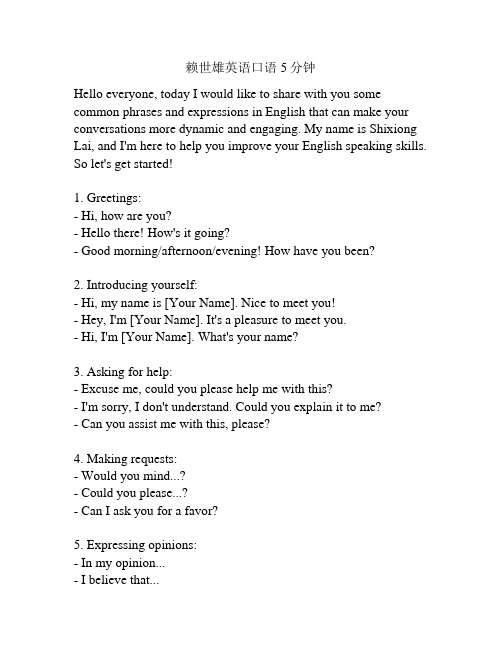
赖世雄英语口语5分钟Hello everyone, today I would like to share with you some common phrases and expressions in English that can make your conversations more dynamic and engaging. My name is Shixiong Lai, and I'm here to help you improve your English speaking skills. So let's get started!1. Greetings:- Hi, how are you?- Hello there! How's it going?- Good morning/afternoon/evening! How have you been?2. Introducing yourself:- Hi, my name is [Your Name]. Nice to meet you!- Hey, I'm [Your Name]. It's a pleasure to meet you.- Hi, I'm [Your Name]. What's your name?3. Asking for help:- Excuse me, could you please help me with this?- I'm sorry, I don't understand. Could you explain it to me?- Can you assist me with this, please?4. Making requests:- Would you mind...?- Could you please...?- Can I ask you for a favor?5. Expressing opinions:- In my opinion...- I believe that...- From my perspective...6. Asking for opinions:- What do you think about...?- How do you feel about...?- Do you have any thoughts on...?7. Making suggestions:- Why don't we...?- How about...?- We could try...8. Apologizing:- I'm sorry for the inconvenience.- I apologize for my mistake.- Please accept my apologies.9. Thanking someone:- Thank you so much!- I really appreciate your help.- Thanks a lot, you're a lifesaver!10. Closing a conversation:- It was nice talking to you. Take care!- I have to go now. Talk to you later!- Let's catch up soon. Bye for now!Remember, practice makes perfect! Don't be afraid to use these phrases in your daily conversations. The more you use them, the more natural they will become. Thank you for your attention, and Ihope you found these expressions helpful. Good luck with your English learning journey!。
赖世雄初级入门

LESSON 1 Greeting (问候)================================早啊!小梅。
你好吗? Good moring,May.How are you?嗨,汤姆。
我很好,你呢? Hi,Tom.I'm fine,and you?还不错,谢了。
Not bad. Thanks.很好,再见。
Good, see you.再见。
Bye.嗨!小梅。
近来如何? Hi, May. How's it going?很好。
那你呢? Gread. And how about you?还不错。
Not bad.好吧,再见。
Ok. Bye.保重。
Take care.你也是。
You too.exam [n 考试]---------------------------------------------------How are you ? Fine\ Gread\So-so,How are you doing? Not bad, thank you.How are you getting along? I'm fine, thanks.How's it going?How do you do!------------------------------------------------------------------ How have you been ? I have been fine, thank you.------------------------------------------------------------------ What's up? Nothing much.What's happening? Same as usual.近来如何?老样子。
------------------------------------------------------------------- 口语中OK == All rightTake caretake care of 照顾.....I hope you will take care of yourseif, too.I hope you can pass the exam, too.I hope I can see you tomorrow.LESSON 2 Courtesy(礼貌)===============================对不起!请问你是安吗? Excuse me. Are you Ann?不,我不是。
- 1、下载文档前请自行甄别文档内容的完整性,平台不提供额外的编辑、内容补充、找答案等附加服务。
- 2、"仅部分预览"的文档,不可在线预览部分如存在完整性等问题,可反馈申请退款(可完整预览的文档不适用该条件!)。
- 3、如文档侵犯您的权益,请联系客服反馈,我们会尽快为您处理(人工客服工作时间:9:00-18:30)。
A: What do you mean?
B: My watch is fast.
甲:嗨,汤姆。请问现在几点了?
乙:现在是六点四十五分。
甲:噢,糟了!我迟到了。
乙:没关系。
甲:你说这话什么意思?
乙:我的表快了。
Part A
A: What day is it today, Tom?
乙:很高兴认识你,小梅。
丙:我也很高兴认识您,林先生。
乙:小梅,那么你贵姓呀?
丙:我姓陈。不过您可以叫我小梅。
乙:陈小梅,这是个好名字。
丙:谢谢您,先生。
Part A
A: Excuse me, Mr. Li. This is Miss Lin.
B: How do you do, Miss Lin?
A: I'm From Japan.
甲:对不起。请问你叫什么名字?
乙:我叫小梅。
甲:嗨,小梅。你是哪里人呢?
乙:我是香港人。那你呢?
甲:我是日本人。
Part B
A: May I have your name, please?
B: My name is May.
甲:很高兴认识你,小梅。
乙:幸会,幸会。
Part A
A: Excuse me. What's your name?
B: I'm May.
A: Hi, May. Where are you from?
B: I'm from Hong Kong. What about you?
C: I'm a secretary. What about you?
B: I'm a pilot.
甲:嗨,汤姆。我想请你见见我的朋友莎儿。
乙:很高兴认识你,莎儿。
丙:我也一样。
乙:那,你从事哪一行的?
丙:我是个秘书。你呢?
乙:我是开飞机的。
Part A
A: Excuse me, Ma'am. What time is it, please?
乙:好的。再见。
Part B
A: May I speak to Mr. Wang, please?
B: Who's calling, please?
A: This is Tom Lin.
B: Hold on, please. (a few seconds later) He's out at the moment.
A: I'm Tom.
B: Oh! Hi, Tom. I'm May.
A: Nice to meet you, May.
B: Pleased to meet you.
甲:嗨,我是汤姆。
乙:对不起,请再说一遍好吗?
甲:我是汤姆。
乙:哦!嗨,汤姆。我是小梅。
There are four seasons in my hometown. It's cool in spring. It's sunny in summer. It's chilly in fall. In winter, it is very cold. Sometimes it even snows.
乙:现在是两点半。
甲:谢谢。请问下一班火车是几点开?
乙:两点四十五分。
甲:我明白了。它准时吗?
乙:是的,它很准时。
Part B
A: Hi, Tom. What time is it, please?
B: It's a quarter to seven.
A: Oh, no! I'm late.
Part A
A: Good morning, May. How are you?
B: Hi, Tom. I'm fine. And you?
A: Not bad. Thanks.
B: Good. See you.
A: Bye.
甲:早啊,小梅。你好吗?
乙:嗨,汤姆。我很好,你呢?
甲:还不错,谢了。
乙:很好,再见。
甲:再见。
Part B
A: Hi, May. How's it going?
B: Great. And how are you doing?
A: Not bad.
B: OK. See you later.
A: Take care.
乙:我不知道。
甲:好吧。我稍后再打来。再见。
Part A
A: Hello, Dr. Chen's clinic. May I help you?
B: Yes, please. I'd like to make an appointment to see Dr. Chen.
A: What's your name, please?
B: She is.
A: Thank you.
B: You're welcome.
甲:对不起,请问你是安吗?
乙:不,我不是。
甲:喔,很抱歉。请问安是哪位?
乙:她是。
甲:谢谢。
乙:不客气。
Part B
A: Hi, I'm Tom.
B: I beg your pardon?
C: How do you do?
A: Miss Lin works for IBM.
B: What a coincidence! I work in a computer company, too.
甲:打扰一下,李先生。这位是林小姐。
乙:林小姐,你好!
丙:你好!
甲:林小姐在IBM公司上班。
B: You, too.
甲:嗨,小梅。近来如何?
乙:很好。那你呢?
甲:还不错。
乙:好吧,再见。
甲:保重。
乙:你也是。
Part A
A: Excuse me. Are you Ann?
B: No. I'm not.
A: Oh, I'm sorry. Who's Ann?
B: My name is Micky Chen.
A: Is 4 o'clock in the afternoon OK?
B: That's fine. Thank you.
甲:哈啰,这里是陈医师珍所。我可以帮您什么忙吗?
乙:是的,麻烦你。我想约见陈医师。
甲:请问尊姓大名?
B: It's Friday.
A: No, it's not. It's Valentine's Day.
B: Happy Valentine's Day, May.
甲:汤姆,今天是几月几号?
乙:今天是二月十四号。
甲:那今天是什么日子呢?
乙:今天是星期五。
甲:不,才不是呢。今天是情人节。
A: How old are you?
B: I'm twenty-five.
A: Where are you from?
B: I'm from Hong Kong.
甲:请问尊姓大名?
乙:我叫小梅。
甲:你几岁了?
乙:我二十五岁。
甲:你是哪里人?
A: This is Tom. Please ask him to call me back as soon as possible.
B: OK. Bye.
甲:哈啰!请问我可以跟鲍勃说话吗?
乙:他不在。
甲:我可以留个话吗?
乙:当然。请说吧。
甲:我是汤姆。请他尽快回电话给我。
A: When will he be back?
B: I don't know.
A: OK. I'll call back later. Bye.
甲:请问我可以跟王先生说话吗?
乙:请问是谁呀?
甲:我是林汤姆。
乙:请稍等一下。(几秒钟后)他现在出去了。
甲:他什么时候会回来呢?
乙:今天是星期日。
甲:那么今天是不是六月六日?
乙:是啊。为什么这样问呢?
甲:因为今天是我的生日。
乙:生日快乐,小梅。
甲:谢了。
Part B
A: What's today's date, Tom?
B: It's February 14.
A: What day is it today?
乙:好巧呀!我也是在一家计算机公司上班。
Part B
A: Hi, Tom! I'd like you to meet my friend, Sal.
B: Pleased to meet you, Sal.
C: Same here.
B: So, what do you do, Sal?
乙:我是香港人。
Part A
A: Hi, Tom! How's it going?
B: Great! Who's your friend?
A: Oh! I'm sorry. This is Kay.
B: Pleased to meet you, Kay.
A: Nice to meet you.
